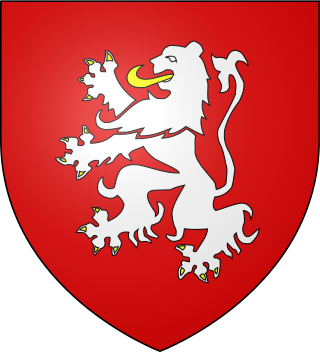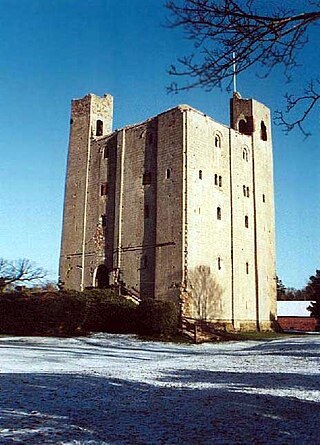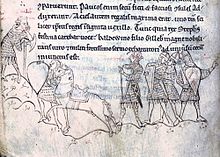
William Marshal, 1st Earl of Pembroke, also called William the Marshal, was an Anglo-Norman soldier and statesman. He served five English kings: Henry II and his son and de jure co-ruler Young King Henry, Richard I, John, and finally John's son Henry III.
Hugh Bigod, 1st Earl of Norfolk (1095–1177) was the second son of Roger Bigod, sheriff of Norfolk and royal advisor, and Adeliza, daughter of Robert de Todeni.

Gilbert de Clare, 4th Earl of Hertford, 5th Earl of Gloucester, 1st Lord of Glamorgan, 7th Lord of Clare was the son of Richard de Clare, 3rd Earl of Hertford (c. 1153–1217), from whom he inherited the Clare estates. He also inherited from his mother, Amice Fitz William, the estates of Gloucester and the honour of St. Hilary, and from Rohese, an ancestor, the moiety of the Giffard estates. In June 1202, he was entrusted with the lands of Harfleur and Montrevillers.

Gilbert de Clare, 6th Earl of Hertford, 7th Earl of Gloucester was a powerful English noble. He was also known as "Red" Gilbert de Clare or "The Red Earl", probably because of his hair colour or fiery temper in battle. He held the Lordship of Glamorgan which was one of the most powerful and wealthy of the Welsh Marcher Lordships as well as over 200 English manors.
Earl of Clare was a title of British nobility created three times: once each in the peerages of England, Great Britain and Ireland.

Ranulf II, 4th Earl of Chester (1099–1153), was an Anglo-Norman baron who inherited the honour of the palatine county of Chester upon the death of his father Ranulf Meschin, 3rd Earl of Chester. He was descended from the Counts of Bessin in Normandy.

Richard de Clare, 5th Earl of Hertford, 6th Earl of Gloucester, 2nd Lord of Glamorgan, 8th Lord of Clare was the son of Gilbert de Clare, 4th Earl of Hertford, and Isabel Marshal. He was also a powerful Marcher Lord in Wales and inherited the Lordship of Glamorgan upon the death of his father. He played a prominent role in the constitutional crisis of 1258–1263.
Aubrey de Vere — also known as "Alberic[us] de Ver" and "Albericus regis camerarius" — was the second of that name in England after the Norman Conquest, being the eldest surviving son of Aubrey de Vere and his wife Beatrice.

Gilbert fitz Gilbert de Clare, was created Earl of Pembroke in 1138.
Gilbert Fitz Richard, 2nd feudal baron of Clare in Suffolk, and styled "de Tonbridge", was a powerful Anglo-Norman baron who was granted the Lordship of Cardigan, in Wales c. 1107–1111.
Richard fitz Gilbert de Clare 3rd feudal baron of Clare in Suffolk, was an Anglo-Norman nobleman. A marcher lord in Wales, he was also the founder of Tonbridge Priory in Kent.

William Marshal, 2nd Earl of Pembroke was a medieval English nobleman and was one of the sureties of Magna Carta. He fought during the First Barons' War and was present at the Battle of Lincoln (1217) alongside his father William Marshal, 1st Earl of Pembroke, who led the English troops in that battle. He commissioned the first biography of a medieval knight to be written, called L'Histoire de Guillaume le Mareschal, in honour of his father.
Baldwin de Redvers, 1st Earl of Devon, feudal baron of Plympton in Devon, was the son of Richard de Redvers and his wife Adeline Peverel.

The Battle of Lincoln, or the First Battle of Lincoln, occurred on 2 February 1141 in Lincoln, England between King Stephen of England and forces loyal to Empress Matilda. Stephen was captured during the battle, imprisoned, and effectively deposed while Matilda ruled for a short time.

The House of Clare was a prominent Anglo-Norman noble house that ruled the Earldoms of Pembroke, Hertford and Gloucester in England and Wales throughout its history, playing a prominent role in the Norman invasion of Ireland.

Aubrey de Vere, 1st Earl of Oxford was an English noble involved in the succession conflict between King Stephen and Empress Matilda in the mid-twelfth century.

The Chief Baron of the Irish Exchequer was the Baron (judge) who presided over the Irish Court of Exchequer. This was a mirror of the equivalent court in England, and was one of the four courts which sat in the building in Dublin which is still called The Four Courts.
Alan la Zouche (1205–1270) was an Anglo-Norman nobleman and soldier of Breton descent. He built the Zouches Manor in Cambridgeshire. He was High Sheriff of Northamptonshire from 1261 to 1266.
Gilbert Basset was an English baronial leader during the reign of King Henry III.
William de Hastings, was an English soldier and noble.










